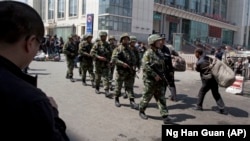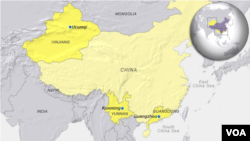An Islamist militant group called the Turkistan Islamic Party (TIP) claimed responsibility for a deadly bomb attack at a train station in China's western city of Urumqi in late April that killed three people and injured 79.
China had said the attack in its restive Xinjiang region, home to the Muslim Uighur ethnic group, was carried out by two religious extremists who were among those killed in the blast.
Other attacks, expanding government concern
Earlier, police in Xinjiang were seeking assailants who brutally killed three Han officials in late April. Radio Free Asia reported Thursday that the brutal slayings appeared to have been timed to the visit of President Xi Jinping, who urged greater integration between the Uighurs and the China’s majority ethnic Han. A bomb explosion on the final day of Xi’s four-day visit was widely interpreted as a rejection of his conciliatory comments.
Recently, violence has spread to other cities. Ethnic Uighurs were blamed for violent attacks at railway stations in Guangzhou and Kunming.
Authorities in major cities such as Beijing and Shanghai have increased surveillance in public transportation centers following the attacks. In October, five people were killed in an assault at Beijing’s Tiananmen Square which officials blamed on the East Turkestan Islamic Movement.
Reasons behind unrest
The reasons for the unrest among Uighurs in Xinjiang are varied, according to Nury Turkel, Uighur-American attorney and former president of the Uighur American Association.
“Since [Beijing’s] occupation of the Uighur’s homeland that the Uighurs called East Turkestan, which is referred to as the Xinjiang Autonomous Region, all forms of political repression have escalated, particularly since 9-11, and then they reached a new level after the July 5 [2009] ethnic clash in Urumqi,” Turkel said.
“Instead of looking at reexamining its minority policy, the Chinese government mistakenly believed that they can subjugate the Uighurs and they can continue to make the Uighurs second-class citizens,” he said.
Others say the government and Uighur extremists have both contributed to the current tense situation. Yan Sun, a political science professor at the City University of New York, says both the Chinese government and the Uighur extremists have contributed to the current tense situation.
Sun says the Chinese government’s policy in regard to Uighur religious practices has been brutal. “The policy has been draconian, especially on youngsters under the age of 18, who are not allowed to have legitimate Islamic education,” she said.
Sun, who visited Xinjiang last fall, believes the restrictions have encouraged some parents to seek underground madrassas for their children. These same madrassas, she notes, have Central Asian, Wahabi, Pakistani and Afghan influences that can encourage radicalism.
“I have actually visited some of the underground sites, some of them have weapons, they teach violence, they teach jihad,” Sun adds. “I would say the overwhelming majority of Uighurs are squeezed in between the draconian policies of the Chinese government and the fundamentalists.”
But religious and cultural issues are not the only sources of tension. Sean Roberts, associate professor of international affairs at The George Washington University says China’s continuing development in Xinjiang is also a factor in the unrest. He says the expansion is related to Beijing’s economic and natural resource interests in the west and south.
“I think a lot of Uighurs right now feel that they are marginalized in the areas they see as their homeland, “ Roberts says. “They feel as though they are being pushed aside in Xinjiang.”
“I think that’s something that’s often overlooked in terms of reasons that there might be a lot of discontent among the Uighurs,” says Roberts
.
Turkel suggests China’s president does not understand the concerns of Xinjiang’s residents. He says the recent arrest of writer and scholar Ilham Tohti for inciting separatism fuels those concerns.
Turkel says the arrest of a moderate scholar who promotes cultural understanding between the Uighurs and the majority Han Chinese, has caused many Uighurs to feel “hopeless.”
“The hopelessness sometimes leads you to making poor judgments, and doing something not so acceptable in various societies and various cultures,” he said.
But Sun believes that the Chinese government has tried to help the Uighurs through affirmative action. “I don’t think it’s fair to arrest [Tohti],” she said. “On the other hand…the [government’s] biggest harm is to actually deprive Uighurs of the motive of finding some way to work to this transition to the market; economic liberalization has not been kind to a lot of people, Han people too.”
Beijing says its policies have brought economic development and a higher standard of living to Uighurs in Xinjiang. But Roberts says the improvements have come at a cost.
“I think the Chinese government is attempting to do various things to integrate the Uighurs more into the PRC and into the general idea in the PRC of what is a better life, the question is whether that’s appealing to all Uighurs, I think it is to some, but not to all,” he said.
Last week’s attack in Guangzhou coincided with the release of an academic review of China’s national security, which said that the country’s terror threats are growing.











